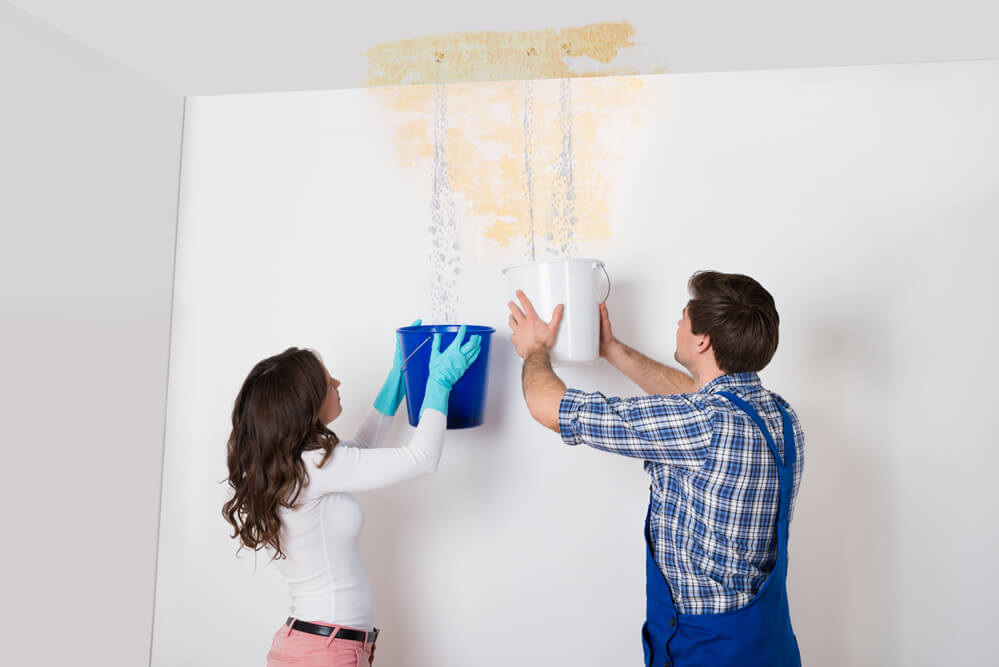Water leaks may occur at practically any time of the year, although systems tend to be more vulnerable during the winter time, if pipes have been allowed to freeze and rupture.
The leak may be obvious and immediately noticeable, or it may be a hidden and insidious leak which is difficult to trace.
Whatever the causes, any leak of water may cause considerable damage to the structure and fabric of your property and to its contents. It is one of the major risks against which both standard home insurance and landlords insurance for let properties offer protection.
So, if you are unfortunate enough to have your let property affected by a water leak, what action needs to be taken?
Stopcocks
- both you and your tenants need to know where the internal water supply stop cock is located – typically under the kitchen sink, although it may be anywhere near the beginning of the supply system within the property;
- in an emergency, if you do not know where the stop cock is located or your tenants are out at work and you are unable to gain access to the property, you may need to contact the water supply company to turn off the supply at their own stop valve or water meter (generally outside, between the pavement and the boundary wall of your property);
- the water company may make a charge for shutting off the water supply in this way;
Trace the leak
- with the water supply safely isolated, try to track down the source of the leak – as a first step in establishing just what needs to be repaired and the extent of any damage already caused;
- where a leak seems to be coming from pipework buried in a wall or otherwise difficult to access, bear in mind any further damage a tradesman may cause by trying to trace the leak;
- some landlords insurance policies – such as ours – may include specific provision for the cost associated with tracing and accessing such inaccessible sites;
- before you have any repairs carried out, however, make sure you contact your insurer or insurance broker first (see below);
Contact your insurer
- whether or not you are successful in your search for the source of the problem, and certainly before causing any further damage by trying to access it, it is important to call your insurer to record the incident;
- if your policy is with us here at Cover4LetProperty, we can discuss your claim and make reporting of the incident to your insurer easier.
Loss adjusters
Depending on the nature and extent of any damage you have reported, the insurer may decide to make an appointment with you for a loss adjuster to inspect the property.
It’s quite normal for an insurer to appoint a loss adjuster for a water damage claim, especially if the damage is significant or the repair costs could be high.
A loss adjuster is an independent professional who investigates claims on behalf of the insurance company. Their role is to:
- assess the extent of the damage;
- verify that the claim falls within the terms of your policy;
- help agree the cost of repairs or replacements;
- sometimes, help speed up the settlement of your claim.
It doesn’t automatically mean your insurer thinks there’s a problem or that they’re going to reject your claim. They just want an expert, impartial view before making a decision.
Here’s what you can do to prepare:
- have any documents ready, like your policy, proof of ownership, and any photos you took of the damage;
- be honest and consistent with your account of what happened;
- point out anything you’ve done to prevent further damage (like calling an emergency plumber or drying things out with commercial fans – which will affect your electricity bill).
If your claim is genuine and within the terms of your policy, a visit from a loss adjuster should actually help move things forward.
Alternative accommodation
Depending on the extent of any damage caused by the leak, you may need to consider your responsibility for finding alternative accommodation for your tenants until repairs have been made. The costs of such alternative compensation and the loss of the rental income you might otherwise have enjoyed is typically covered by your landlord insurance policy. Again, you will need your insurer’s authority before finding alternative accommodation for your tenants.
Quotes for repairs
- this is the time when you need to ask for quotes for the repair of the problem;
- clearly, these need to be done by adequately qualified tradesmen and technicians and you are likely to need to furnish at least three independent quotes for your insurer to consider;
- the loss adjuster responsible for your claim may have already suggested a settlement figure or may be called upon to recommend acceptance of a particular quote – remember, the excess may need to be taken from this amount;
- although it is your responsibility to take whatever immediate action is necessary to prevent further loss or damage, under no circumstances authorise repairs to go ahead until you have received clear authorisation from your insurance company – to do so may prejudice the successful outcome of your claim;
Drying out
- depending on the severity and circumstances of the escape of water and the loss or damage caused, you may need to wait for the property to dry out thoroughly before any repairs can be attempted – this may take a lengthy or period of time;
Repairs
- once there has been a sufficient drying out – a matter on which you may need further professional advice – you may proceed to get the repairs done in accordance with one of the quotes authorised by your insurer.
A water leak may cause untold loss and damage to your let property. It may be prudent to remind yourself exactly what steps and course of action need to be taken to ensure a prompt repair and return to normal, together with a full and fair settlement of your insurance claim.








